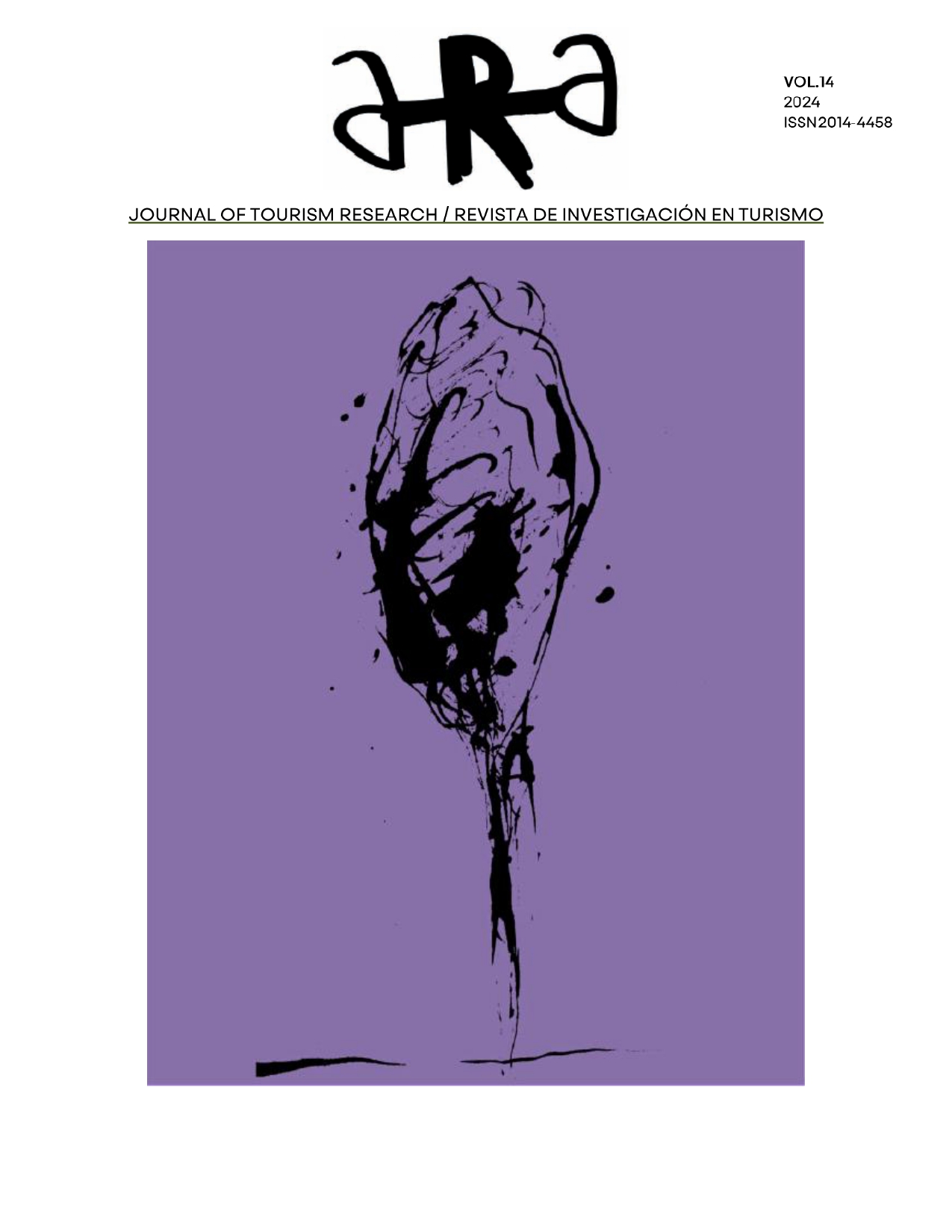Tourism competitiveness indicators. The case of three colonial destinations in Mexico
DOI:
https://doi.org/10.1344/ara.v14i1.44766Keywords:
Colonial destinations, Competitiveness, Tourism, Tourist inflowAbstract
The complexity of the tourist activity makes it dificult to determine a set of indicators that could be applied in a universal way to improve the competitiveness of the destinations. The target is to analyze what are the indicators that differentiate the competitive position of the analyzed cultural destinations and to confirm the competitive position of the same ones taking like the tourist inflow as regarding. Surveys were conducted with the providers of tourist services in the destinations of Puebla, Oaxaca, and San Cristóbal de las Casas. The cluster statistical analysis, the conformation of competitiveness indexes and the discriminant analysis allowed to identify that the indicators of situational conditions, tourist general infrastructure, natural resources, and tangible hereditary resources help to differ to the evaluated destinations
References
Alcocer, L. J. A. (2013). Competitividad en el sector turístico: una revisión de la literatura. Revista Lebret, 5, 271-291.
Amaya, M. C. M., Sosa, F. A. P., y Moncada, J. P. (2017). Determinantes de competitividad turística en destinos de sol y playa mexicanos. Región y sociedad, XXIX(68), 279-315.
Assaf, G., y Josiassen, A. (2012). Identifying and Ranking the Determinants of Tourism Performance: A Global Investigation. Journal of travel research, 51(4), 388-399.
Assaker, G., Hallak, R., Esposito, V. V., y O’Connor, P. (2013). An empirical operationalization of countries’ destination competitiveness using partial least squares modeling. Journal of travel research, 53(1), 26-43.
Bernal, T. C. A. (2006). Metodología de la investigación. Pearson Prentice Hall.
Crosby, A. (2009). Re-inventando el turismo rural. In Arturo Crosby (coord.), Re-inventando el turismo rural, gestión y desarrollo (pp. 13-20). Editorial Laertes.
Crouch, G., y Ritchie, B. (1999). Tourism, Competitiveness and Societal Prosperity. Journal of Business Research, 44(3), 137-52.
Crouch, G. (2007). Modelling destination competitiveness: a survey and analysis of the impact of competitiveness attributes Australia: CRC for Sustainable. Tourism Journal of Travel Research, 50(1), 27-45.
Custódio S. M., Ferreira, A. M., y Costa, C. (2014). Influential factors in the competitiveness of mature tourism destinations. Tourism & Management studies, 10(1), 73-81.
DataTur (2018). Compendio estadístico de la actividad hotelera. https://www.datatur.sectur.gob.mx/SitePages/ActividadHotelera.aspx
Dwyer, L., y Kim, C. (2003). Destination Competitiveness: Determinants and Indicators. Current issues in tourism, 6(5), 369–414.
Dwyer, L.; Mellor, R.; Livaic, Z.; Edwars, D y Kim C. (2004). Atributes of destination Competitiveness: A factor analysis. Tourism Analysis. 9:91-101.
Gandara, J. M., Chim, M. A. F., Domareski, T. C., y Augusto, B. A. (2013). La competitividad turística de Foz Do Iguacu según los determinantes del integrative model de Dwyer & Kim: analizando la estrategia de construcción del futuro. Cuadernos de Turismo, 2013(31), 105-128.
Molina, M. R., Ochoa, G. M., y Leco, T. C. (2014). Políticas públicas y factores que determinan la competitividad turística de Morelia, México y de Alcalá de Henares, España. Revista CIMEXUS, IX(2), 49-67.
Organización Mundial de Turismo. (2015). La conferencia Mundial sobre el Turismo y Cultura de la OMT y la UNESCO. http://media.unwto.org/es/press-release/2015-02-09/la-conferencia-mundial-sobre-turismo-y-cultura-de-la-omt-y-la-unesco-reune
Papp, Z., y Raffay, A. (2011). Factors influencing the tourism competitiveness of former socialist countries. Journal of Studies and Research in Human Geography, 5(2), 21-30.
Pérez, C. E. O., Leyva, L. J. C., Castillo, O. M. G., Zazueta, H. M. M., y Figueroa, P. J. F. (2018). Análisis comparativo de la competitividad de los destinos turísticos Querétaro y Guanajuato bajo un enfoque multicriterio. Teoría y Praxis, 2018(6),153-186.
Porter, M. (1990). The competitive advantage of nations. Harvard Business Review, 68(2), 73-93.
Porter, M. (2012). Estrategia competitiva: Técnicas para el análisis de los sectores industriales y de la competencia. Patria.
Rodríguez, D. M., y Espino, R. T. (2008). A model of strategic evaluation of a tourism destination based on internal and relational capabilities. Journal of travel research, 16, 368-380.
Román, A. B. (2009). Análisis comparado de la competitividad turística en la Patagonia Austral. CEDDAR, 18(4), 1-22.
Siles, L. D. (2016). Competitividad de los destinos turísticos: caso del mediterráneo español. [Tesis doctoral. Facultad de ciencias de la empresa. Departamento de economía. Universidad Politécnica de Cartagena].
Secretaria de Turismo (SECTUR) (2013). Programa Sectorial de Turismo 2013-2018. México. http://www.sectur.gob.mx/PDF/PlaneacionTuristica/Prosectur_2013_2018.pdf
Secretaría de Turismo. (2018). Compendio estadístico del turismo en México. https://www.datatur.sectur.gob.mx/SitePages/CompendioEstadistico.aspx
Troitiño, V. M. A. (2002). El patrimonio arquitectónico y urbanístico como recurso turístico. In: García Marchante, Joaquin Saúl; Poyato Holagado, Maria del Carmen (coords), La función social del patrimonio histórico: el turismo cultural (pp. 9-32). Editores Cuenca.
Um, F. E. (2010). Competitividad de destinos turísticos culturales como complemento al turismo sol y playa. XV Congreso AECIT. Tiempos de cambios en el turismo. Dinámica de transformación del Turismo en el siglo XXI. AECIT.
WEF. 2016. The global competitiveness report 2016–2017. http://www3.weforum.org/docs/GCR2016-2017/05FullReport/TheGlobalCompetitivenessReport2016-2017_FINAL.pdf
Downloads
Published
How to Cite
Issue
Section
License
Copyright (c) 2024 Reyna Tello Pérez, Julio Cesar Torres Valdez, Miguel Sánchez Álvarez, Javier Gómez Diaz

This work is licensed under a Creative Commons Attribution-NonCommercial-NoDerivatives 4.0 International License.
The authors who publish in ARA agree to the following terms:
- Authors retain copyright and grant the journal the right of first publication.
- Texts will be published under a Creative Commons Attribution License that allows others to share the work, provided they include an acknowledgement of the work’s authorship, its initial publication in this journal and the terms of the license.
- This material may not be used for commercial purposes.
- You may not distribute the modified material.
Attribution-NonCommercial-NoDerivatives 4.0 International (CC BY-NC-ND 4.0)














